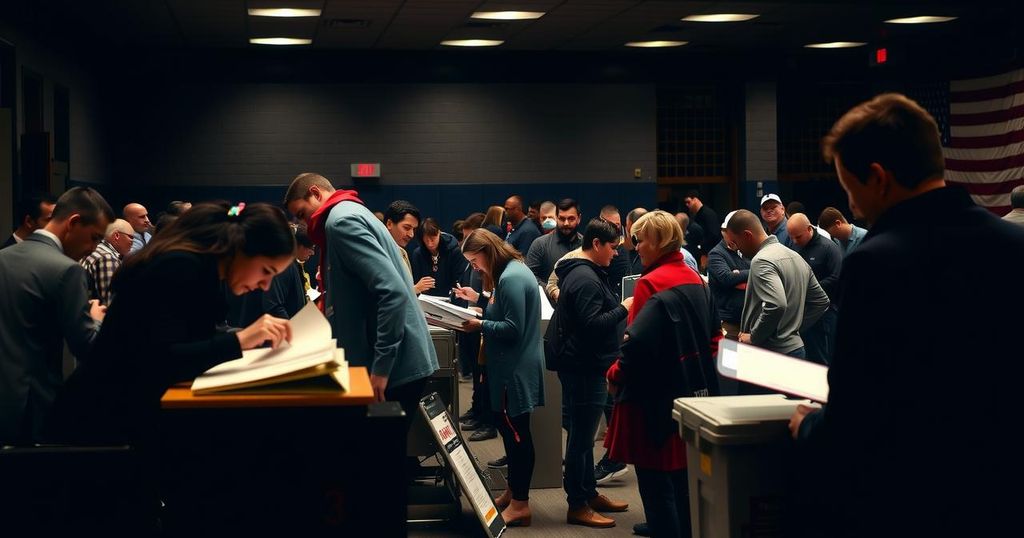Washington Voters Anticipate Election Day with Focus on Presidential Race

As Election Day nears in Washington, nearly all voter attention has turned towards the presidential contest between Vice President Kamala Harris and former President Donald Trump, overshadowing key local races. Voters express significant anxiety regarding Trump’s potential return to power, with many perceiving the election as crucial for the future of democracy. Local candidates are adapting their campaigns to align with these national concerns amidst a backdrop of decreased voter turnout compared to previous elections.
As Election Day approaches in Washington, voters are primarily focused on the presidential race, overshadowing local contests, including the gubernatorial election and various congressional elections. Interviews conducted with voters reveal a predominant anxiety surrounding the contest between Vice President Kamala Harris and former President Donald Trump, despite the reality that the victor will not be determined in Washington State. David Phillips, a public health researcher, expressed that the national election resonates more with voters than local issues, stating, “It really crowds out everybody’s attention span for all of the smaller stuff, which is probably more directly impactful on my life.” This sentiment is common among voters, who articulate a collective dread regarding a potential Trump victory and its implications for democracy and societal stability. Local candidates, while seeking to elevate their profiles, often tailor their messaging around the national narrative. Bob Ferguson, the Democratic gubernatorial candidate, utilized campaign ads highlighting his opponent’s past praises for Trump. In another closely watched congressional race, incumbent Democrat Rep. Marie Gluesenkamp Perez is navigating a Republican-leaning district, refraining from explicitly stating her preference for the presidential candidates. Amidst concerns about crime, inflation, and societal safety, voters like Jodie Bosma express a degree of optimism for a Trump victory, linking security with immigration issues, while others reveal their worries regarding women’s rights and the economy. Retired voters, such as Sandy Robinson, voice a complex mix of concerns related to costs of living and governance, ultimately seeing Harris as “maybe just the lesser of the two evils.” For many, the partisanship surrounding presidential candidates extends to local concerns, leading to heightened emotional stakes in the upcoming elections. As the state experiences a lower voter turnout compared to the last presidential election cycle, the atmosphere remains tense, marked by anxiety and apprehension, exacerbated by Trump’s divisive rhetoric on voting processes and integrity. Mike Kenna, who oversees ballot printing, noted that accusations against the election system have surged since Trump’s comments, exemplifying the contentious climate this election cycle. Ultimately, as more than 68 million Americans have already cast their votes, the prevailing sentiment among voters in Washington reflects a growing unease, reflecting deeper national issues that are shaping election outcomes.
The article addresses the pivotal focus of Washington voters as Election Day approaches, particularly highlighting their anxieties about the presidential race overshadowing local contests such as the gubernatorial election and congressional seats. It emphasizes how national factors, specifically the election’s implications for future governance and societal norms, dominate the voters’ mindsets, despite the crucial local decisions needing their attention. The discussion also touches upon voter turnout and its implications for both the presidential race and local elections, illustrating the complex interplay between local and national political landscapes in the context of current events.
In conclusion, as Washington voters head towards Election Day, the overwhelming focus on the presidential race reveals a significant anxiety that overshadows local contests. This dynamic is evidenced by widespread concerns regarding both candidates’ implications for democracy and societal stability. As voters navigate their anxieties and preferences, the links between local and national issues become increasingly pronounced, suggesting that understanding these sentiments is crucial for comprehending the outcomes of the upcoming elections.
Original Source: www.seattletimes.com








